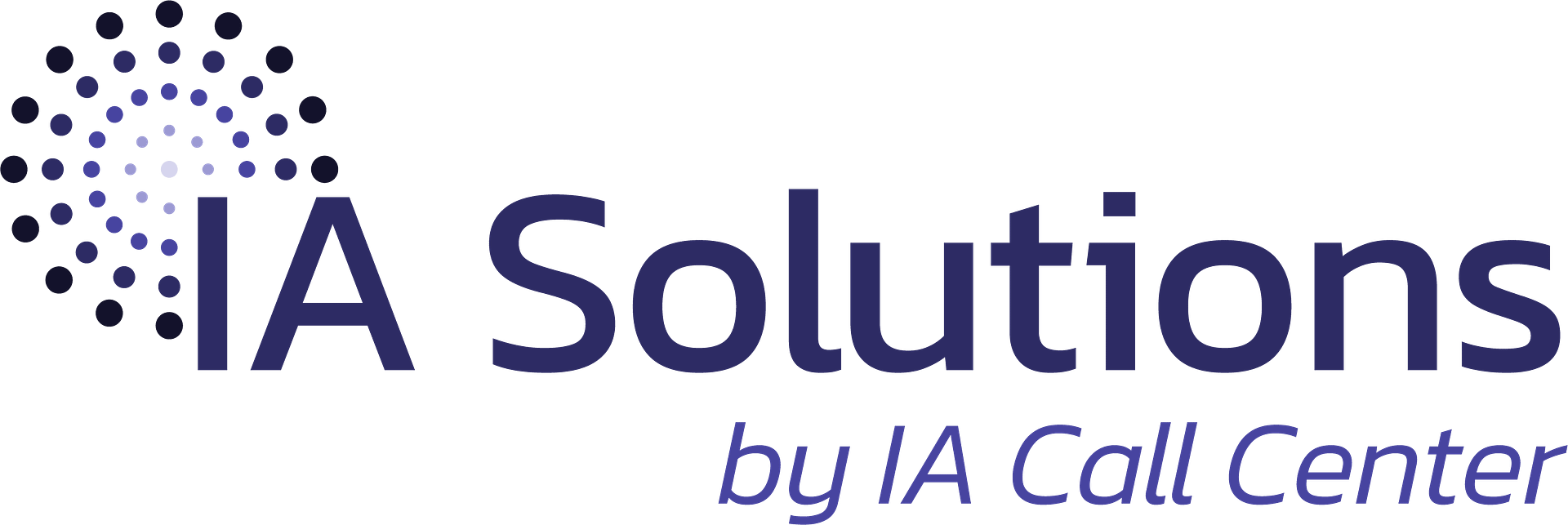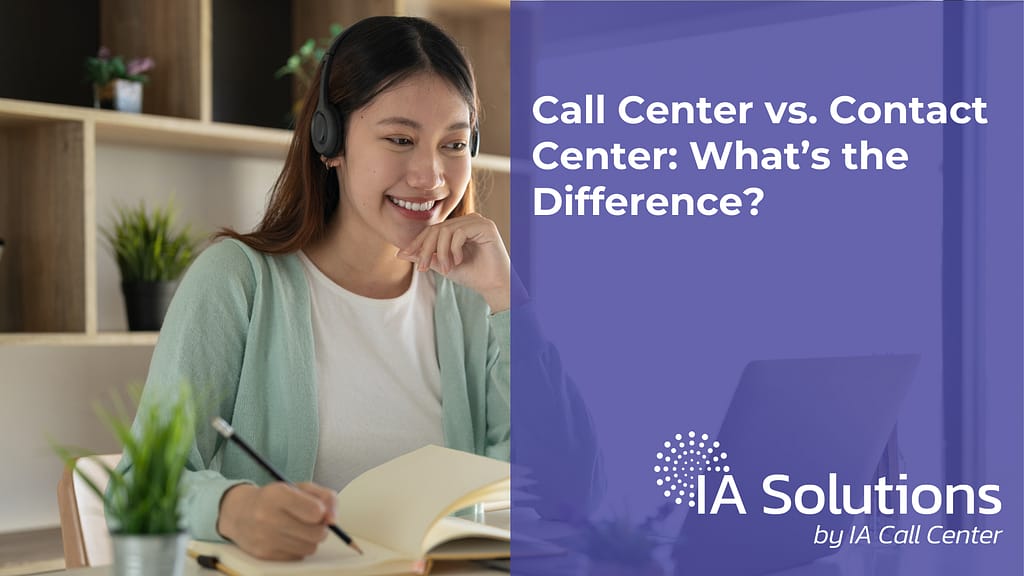Call Center or Contact Center: What’s the Difference?
If you would rather listen to our post about the differences between a call center and contact center instead, click the play button below to hear it now.
Introduction
When most people hear the terms “call center” or “contact center,” they think of them both as being the same thing. After all, whenever you need to contact customer service, it’s the contact center you reach out to, right? Or, wait, is it the call center? Does it even matter?
The truth is, though, that while call centers and contact centers do offer “somewhat similar” types of services (they both support customers), the two types of operations are more different than you might think. Therefore, in this post, we will cover the similarities and differences between call centers and contact centers, so you can decide for yourself which is better for your business.
TL;DR: What is a Call Center?
Enterprise CRM giant Salesforce defines a call center as: “A call center is a unit within most companies that manages inbound and outbound customer calls.” However, this definition is fast becoming outdated, as more companies outsource their customer service efforts to third-party call center vendors. While the essential functions of a call center remain the same (to make calls to and receive calls from customers), most companies now find it more efficient and cost effective to let an outside company manage those tasks – instead of handling them in house.
TL;DR: What is a Contact Center?
According to CloudTalk (a major provider of call center and contact center software), a contact center is essentially a more robust call center with added communication methods and features that enable omni-channel customer service and support through phone, live chat, email, and other communication methods. Contact centers tend to cater to companies that require multiple communication options for their customers, rather than depending on phone calls only.
Major Differences Between a Call Center and a Contact Center
Many people confuse the terms “call center” and “contact center” and use them interchangeably. And while call centers and contact centers perform some of the same functions (i.e. they both make and receive calls), there are some considerable differences between the two. To help you better understand the differences between call centers and contact centers (as well as their similarities), let’s take a closer look.

Communication Channels
Communication channels, as they relate to call centers and contact centers, are the methods used by customers to contact customer service agents (or vice versa.)
Call Centers
Call centers provide single channel communications between agents and customers via phone calls. These calls can be inbound (where customers call the call center) or outbound (where agents make calls to customers.) In most cases, phone calls are the only communication method used by call centers. However, there are some call centers that use texts (SMS) in conjunction with standard calls.
Contact Centers
Contact centers take advantage of omnichannel communications, which means agents can communicate with customers using different methods. Omnichannel communication (often referred to as multi-channel communication) lets customers and contact center agents communicate via phone calls, SMS, email, live chat, messenger apps, community forums, and social media platforms. Some contact center solutions even enable video call support and self-service portals.
Primary Usage (Use Cases)
While there is overlap with the functions call centers and contact centers perform, there are some use cases where one solution might be better than the other. To help you decide on which solution might be best for your company, here are some typical use cases for both call centers and contact centers.
Call Centers
Call centers are a cost-effective solution for any company that relies heavily on traditional phone services to communicate with customers – whether it be through inbound or outbound calls. Common use cases for a traditional call center include billing, verbal market research, customer complaint resolution, personalized customer support, booking services, debt collection, telemarketing, and cold calling.
Contact Centers
Because contact centers offer more communication channels than call centers (and the fact that many contact centers offer traditional phone services as well), they offer more flexibility in the types of scenarios for which they can be used. Essentially, though, a contact center can support all use cases generally associated with a call center. Additionally, contact centers are a great choice when companies need self-service options for customers (i.e. checking an account balance online), appointment scheduling, online help or support tickets, lead generation, and data gathering, just to name a few.

Queue Management
When it rains, it pours. We’ve all heard it before; and such can be the case when it comes to customer service and support. During peak periods or times when customers may have problems accessing services (for whatever reason), call volumes or contact requests can spike considerably. This means not all customers may be able to reach an agent immediately, which results in hold or standby times. Therefore, let’s look at how call centers and contact centers manage queues.
Call Centers
A call center requires only a single solution to manage conversations and queues. This is because all communications come in through phone calls. Because call center agents only provide phone service and support, they can usually handle calls relatively quickly, which can reduce queue times for callers. Of course, during extremely busy periods, customers may still need to hold or wait their turn in the queue.
Contact Centers
Although contact centers enable agents to communicate with customers over multiple channels, a single unified tool is required to manage conversations and accept incoming contact requests. An agent at a busy contact center can receive multiple requests via multiple channels all at the same time. This, of course, can increase the number of customers in the agent’s queue. However, better contact center software solutions do a reasonably good job at spreading contact requests out among agents, so that requests are routed to the agent(s) with the lightest workload at any given time.
Workforce Requirements
Both contact centers and call centers employ customer service agents. And while both types of agents need to have excellent customer service and phone skills, other talents may be needed as well. With that in mind, let’s look at what skills might be required for agents to provide the best possible service in call centers and contact centers.
Call Centers
By and large, call center agents need only master one communication platform in order to manage conversations and make or receive calls. Therefore, on the software side of things, call center agents don’t have as many tools or systems to learn as their contact center counterparts do. Nevertheless, better call centers provide service and support agents that specialize in the industries and verticals of their clients. This means that the agents need to have a good working knowledge of the industry or service type they support.
Contact Centers
Since contact center agents need to support customers over multiple channels, they tend to be a little more “tech savvy” when compared to call center agents. This is primarily because contact center agents not only need to provide excellent phone service, they also need to be adept at composing emails (so they need good writing skills), working with live chat software, and engaging with customers via social media apps and messaging services. Industry knowledge and specialization may not be as important for contact center agents; nevertheless, better contact centers provide relevant training just the same.
Support: Proactive vs. Reactive
The nature of support provided by call centers and contact centers is perhaps the most significant differentiating factor when comparing the two types of services. Let’s look at how the two types of services generally handle support issues and requests.
Call Centers
For the most part, a call center offers a much more “reactive” type of customers service. This means that call centers generally only provide assistance and support after a customer or user calls in. After receiving a call, agents then help or assist customers. This is the more traditional support method, which companies have relied on for decades.
Contact Centers
Most contact centers can provide reactive support as well (when they receive calls.) However, most times, contact centers are much better at offering “proactive” help or support to customers. For instance, contact center agents may reach out when a customer seems to be stuck on a page on a website, offer support on social media after reading a negative review or post, or proactively sending a live chat message to encourage the customer to ask questions. These are just a few of the proactive methods contact center agents can use to help customers.

Self-Service Options
As people become more tech savvy overall, more customers choose to use self-service options for information or support, rather than communicating with a customer service agent. Therefore, let’s review some of the self-service options offered by call centers and contact centers.
Call Centers
Mostly, call centers offer very little in the way of self-service options for customers. Yes, some call centers do utilize IVR systems (Interactive Voice Response) systems that enable voice access to phone menus and basic operations, such as checking an account balance or date of last payment. Besides the IVR option, though, call centers typically don’t offer customers any other self-service options.
Contact Centers
Overall, contact centers offer many more customer self-service options than call centers. In fact, this is one of the main reasons companies migrate from call centers to contact centers. While the types of self-service options for a contact center will vary (depending on the software and system used), common ones include self-service portals, chatbots, community forums, and account information lookup via online-form search, just to name a few.
Advantages of Call Centers
At first glance, call centers may seem inferior to contact centers – based solely on the features and services the two systems support. However, there are indeed several advantages to using a call center for your customer service needs. Some of those advantages include:
- High Call Volume Capacity – Perhaps the biggest advantage to using a call center is the fact they can handle large call volumes reliably and efficiently. Modern VOIP (Voice Over IP) technologies used by call centers are both reliable and scalable.
- Call Centers are Less Expensive – Licensing or purchasing costs for call center software are usually much lower than those of omnichannel systems used in contact centers. As a result, call center services are usually (hands down) cheaper.
- More In-depth Analytics – Because call centers support only phone calls, the software used to manage these systems can provide tremendously detailed analysis of the real-time performance of agents, as well as snapshots of trends and KPIs (Key Performance Indicators).

Advantages of Contact Centers
Now, let’s take a look at some advantages contact centers offer. Some key advantages of contact centers include:
- Better View of Customer Information – Because of the breadth of communication channels used in contact centers, they use and keep more customer data than call centers. This means when a customer reaches out to a contact center, the agent responding to the request can quickly view any previous interactions (whether by phone, text, email, live chat, etc.) This facilitates better overall support by saving time and effort for both the customer and the agent.
- Faster Resolutions – With call centers, customers are often forced to repeat their issues or needs when passed from one agent to another, or if they need to call for support more than once. With a contact center, all previous interactions are saved in a database, which results in less frustration for the customer and faster resolution of their problems.
Which Should You Choose for Your Business?
If your business relies mostly on phone calls for customer service or support, or if you’re looking for the more affordable option, then a call center may be the solution for you. However, if your company interacts with customers through many channels and requires more proactive support options, then a contact center will probably be a better choice.
Popular contact services industry provider, Nextiva, advises that call centers are generally better for small companies looking to save some money or avoid “feature overload.” On the other hand, Nextiva also suggests that contact centers are more appropriate for large companies needing to support customers in as many ways as possible.
Ultimately, whether you should use a call center or contact center will depend primarily on two things: your budget and the communication channels you want to enable and support. Optionally, you might choose to work with a call center and then upgrade to a contact center as warranted. Better providers even able you to migrate from a call center service to a contact center setting with no interruption in service.
IA Solutions Has You Covered
Choosing between a call center or contact center solution can be hard; but it doesn’t have to be. IA Solutions by IA Call Center has been providing superior customer support options for customers for over 50 years. At IA Solutions, not only do we offer best-in-class call center services, we also provide access to exceptional omnichannel contact center options.
Whether you want to start off slowly with a competent and professional call center solution, or you want to go big and provide your customers as many support options as possible, IA Solutions has you covered.
When you partner with IA Solutions, we work with you to tailor our call and contact center services to provide your customers outstanding support while offering your company clear, tangible value.
If you would like to find out how partnering with IA Solutions can help your business provide better customer service and support, please click here to contact us for a no-cost, no-obligation consultation.















